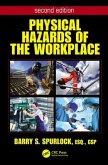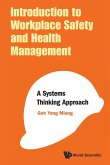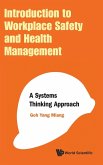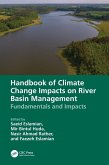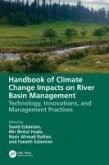Climate Change Impacts on Workplace Health and Safety
Adaptations, Interventions and Responses
Herausgeber: Moda, Haruna Musa; Gruszecka-Kosowska, Agnieszka; Khoshakhlagh, Amir Hossein
Climate Change Impacts on Workplace Health and Safety
Adaptations, Interventions and Responses
Herausgeber: Moda, Haruna Musa; Gruszecka-Kosowska, Agnieszka; Khoshakhlagh, Amir Hossein
- Gebundenes Buch
- Merkliste
- Auf die Merkliste
- Bewerten Bewerten
- Teilen
- Produkt teilen
- Produkterinnerung
- Produkterinnerung
Climate change has become the primary serious human and environmental threat of the 21st century and, with associated variability, it presents enormous potential to affect workers' safety and health as well as the workplace in diverse forms.
Andere Kunden interessierten sich auch für
![Physical Hazards of the Workplace Physical Hazards of the Workplace]() Barry SpurlockPhysical Hazards of the Workplace151,99 €
Barry SpurlockPhysical Hazards of the Workplace151,99 €![INTRODUCTION TO WORKPLACE SAFETY AND HEALTH MANAGEMENT INTRODUCTION TO WORKPLACE SAFETY AND HEALTH MANAGEMENT]() Goh Yang MiangINTRODUCTION TO WORKPLACE SAFETY AND HEALTH MANAGEMENT67,99 €
Goh Yang MiangINTRODUCTION TO WORKPLACE SAFETY AND HEALTH MANAGEMENT67,99 €![INTRODUCTION TO WORKPLACE SAFETY AND HEALTH MANAGEMENT INTRODUCTION TO WORKPLACE SAFETY AND HEALTH MANAGEMENT]() Goh Yang MiangINTRODUCTION TO WORKPLACE SAFETY AND HEALTH MANAGEMENT100,99 €
Goh Yang MiangINTRODUCTION TO WORKPLACE SAFETY AND HEALTH MANAGEMENT100,99 €![Handbook of Climate Change Impacts on River Basin Management Handbook of Climate Change Impacts on River Basin Management]() Handbook of Climate Change Impacts on River Basin Management188,99 €
Handbook of Climate Change Impacts on River Basin Management188,99 €![Handbook of Climate Change Impacts on River Basin Management Handbook of Climate Change Impacts on River Basin Management]() Handbook of Climate Change Impacts on River Basin Management188,99 €
Handbook of Climate Change Impacts on River Basin Management188,99 €![Occupational Noise and Workplace Acoustics Occupational Noise and Workplace Acoustics]() Occupational Noise and Workplace Acoustics178,99 €
Occupational Noise and Workplace Acoustics178,99 €![Handbook of Climate Change Impacts on River Basin Management Handbook of Climate Change Impacts on River Basin Management]() Handbook of Climate Change Impacts on River Basin Management205,99 €
Handbook of Climate Change Impacts on River Basin Management205,99 €-
-
-
Climate change has become the primary serious human and environmental threat of the 21st century and, with associated variability, it presents enormous potential to affect workers' safety and health as well as the workplace in diverse forms.
Produktdetails
- Produktdetails
- Verlag: CRC Press
- Seitenzahl: 394
- Erscheinungstermin: 31. Oktober 2025
- Englisch
- Abmessung: 240mm x 161mm x 26mm
- Gewicht: 754g
- ISBN-13: 9781032814162
- ISBN-10: 1032814160
- Artikelnr.: 74172793
- Herstellerkennzeichnung
- Libri GmbH
- Europaallee 1
- 36244 Bad Hersfeld
- gpsr@libri.de
- Verlag: CRC Press
- Seitenzahl: 394
- Erscheinungstermin: 31. Oktober 2025
- Englisch
- Abmessung: 240mm x 161mm x 26mm
- Gewicht: 754g
- ISBN-13: 9781032814162
- ISBN-10: 1032814160
- Artikelnr.: 74172793
- Herstellerkennzeichnung
- Libri GmbH
- Europaallee 1
- 36244 Bad Hersfeld
- gpsr@libri.de
Haruna Musa Moda is Associate Professor and Department Head of Environmental Health and Safety at the University of Doha for Science and Technology, Doha, Qatar. Dr. Moda is actively engaged in research, consultancy, and knowledge transfer projects in the UK, West Africa, and Middle East in occupational safety and health, climate change adaption, and safety response among outdoor workers, e-waste management, and workers' safety behaviour. Dr. Moda is a chartered member of the Institution of Occupational Safety and Health (IOSH) and Fellow of the Higher Education Academy and belongs to several professional bodies, including Workplace Health Without Borders (WHWB), Higher Education Academy, Association of Industrial Hygiene, Nigeria, and Environmental Health Registration Council of Nigeria. Amir Hossein Khoshakhlagh is Assistant Professor at the Department of Occupational Health Engineering and Head of International Affairs at Kashan University of Medical Sciences and Health Services, Kashan, Iran and serves as chair of the Health, Safety and Environment (HSE) bureau. Dr. Khoshakhlagh's research interest is in the aspect of chemical agents' exposure at workplaces and Occupational Toxicology. Aside from his research, Dr. Khoshakhlagh is involved in the design of ventilation systems for several industries in Iran. To date, Dr. Khoshakhlagh has authored six books. Agnieszka Gruszecka-Kosowska is Associate Professor at the AGH University of Krakow, Poland, where she is the leader of the Health and Environmental Risk Analysis Team (HERAT). Dr. Gruszecka-Kosowska was a fellow at the European Food Risk Assessment (EU-FORA) Fellowship Programme, Cycle 2021-2022, University of Granada (INYTA-CIBM). She was a Guest Scientist at the Helmholtz Centre for Environmental Research UFZ, Leipzig, Germany, under the fellowship of the German Federal Environmental Foundation DBU. She has authored and coauthored over 50 scientific publications, over 20 conference proceedings, and 3 books on the topics of environmental pollution, human and environmental risk assessment, and environmental epidemiology. Ravi Rangarajan is Assistant Professor in the College of Health Sciences at the University of Doha for Science and Technology, Doha, Qatar. He completed his doctorate in philosophy in Interdisciplinary Earth System Science and Climate Change at the Indian Institute of Science, Bangalore, India, specializing in mass spectrometry and environmental chemistry and is a recipient of the Council of Industrial and Scientific Research Fellowship from the government of India for his Ph.D. dissertation work. Subsequently, he obtained his post-doctoral research experience from the National Taiwan University, Taiwan (R.O.C.), and was a research professor in Environmental and Public Health at St. John' s Academy of Health Sciences, India. He is an established environmental health and safety specialist with research interests in climate change, environmental management and its implications, health and wellbeing, occupational health safety, and toxicology. Kishwar Ali is Assistant Professor at the University of Doha for Science and Technology, Qatar. His principal research focus is comprehensive climate change analysis, with a special emphasis on Qatar's dry ecosystem. Dr. Ali and his international collaborators are working on cutting-edge research that involves predictive modelling of ethnomedicinally valuable plant species endemic to their research area. Dr. Ali makes substantial contributions to plant sciences and environmental studies through his leadership and dedication. Fred Saleh is Associate Dean at the College of Health Sciences at the University of Doha for Science and Technology, Qatar. With a research focus on the biomarkers of DNA damage following environmental exposure, his work has significantly contributed to our understanding of the link between environmental factors and health outcomes. Dr. Saleh's ongoing research and dedication to his field underscore his commitment to improving health outcomes by studying environmental impacts. His work continues to inspire students and colleagues alike, making him a respected figure in the field of environmental health. Michael Phillips is Director of Applied Research, Innovation and Economic Development at the University of Doha for Science and Technology, Qatar. He is also the UNESCO Chair on Technical and Vocational Education and Training (TVET) and Sustainable Development, the QAPCO Professional Chair in Vocational Education, and the coordinator of the UNESCO-UNEVOC Center. He has served as an Adjunct Professor in Canada, Iceland, and Malaysia. He is a Director and Trustee of the US Coastal Education and Research Foundation (CERF) Inc., where his role includes Regional Vice-President for the Middle East. He has created interdisciplinary clusters to achieve applied research, business, and commercialization goals, and has integrated TVET into new models of Work Based Learning and Enterprise Education.
PART I: Health and Safety in the Face of Climate Change Chapter 1 Climate Actions for Workplace Safety and Health Intervention in Construction IndustryFaris Omer, Rasha Ali Abdelrahim, Lekha Kozhiparambath, Ahmed Elidrisy, and Haruna Musa ModaChapter 2 Navigating Climate Change Impact: Resilience and Adaptation Strategies for Construction Project Delivery in Emerging EconomiesBello Mahmud Zailani, Muhammad Aliyu Yamusa, Mu'awiya Abubakar, Joy Maina, and Yahaya Makarfi IbrahimChapter 3 Review of Climate Change Impact on Workplace Health and Safety in the Global Manufacturing IndustryDevathanthrige Janaka Chamara Harshana Senadeera, Abu Sadat Muhammad Sayem, Walter Leal Filho, Grace Farhat, and Haruna Musa ModaChapter 4 Impacts of Climate Change on Workplace Health and Safety in Nigeria: A Systematic Review of Adaptations, Interventions, and ResponsesAnthony KoläOlusanyaChapter 5 Impacts of Climate Change on Workers' Health and SafetyKassu Jilcha Sileyew PART II: Climate Impact and Well-Being Chapter 6 Climate Change Impacts on Crops, Future Challenges, and Mitigating Strategies: An Era of Food Security Peter Ameh Adegede Chapter 7 ynergistic Impacts of Climate Change and Pesticide Exposure on the Health of Farm Workers John Gushit and Idoko Ogbe Chapter 8 Atrazine Exposure in the Age of Climate Change: Uncovering the Risks and Exploring Sustainable Solutions Lauritta Chinazaekpere NdufeiyäKumas PART III: Climate Change and Community Resilience Chapter 9 Climate Change and Viral Proliferation: Implications for Global Health and Well-Being Esra Bü
ra I
k, Ebru Sars
lmaz, and Asif M. Khan Chapter 10 Nourishing Resilience and Adaptation: Addressing the Impact of Climate Change on Maternal and Child Health in the Workplace Samuel Atta Tonyemevor, Mary Amoako, Charles Martyn
Dickens, and Leonard Amekudzi Chapter 11 Impact of Climate Change and Extreme Weather Conditions on the Commitment of Allied Health Professionals Towards Adopting a Healthy Lifestyle Albara Alomari, Alham Abuatiq, Jamila Albajaly, Yasin M. Yasin, Ayat Kadhi, Mahmoud Nadar, Arlene Masaba, Fahima Yusuf, X Joanne Jaramillo, Asma Alamgir, and Shannan MacNevin Chapter 12 Application of Circular Economy Principles to Promote Sustainable Well-being in Qatar: A Literature Review Juliet Gladies Jayasuria, Kurobuza Tukamushaba Eddy, and Dan Musinguzi PART IV: Climate Change Adaptation and Community Resilience Chapter 13 Nature-based Solutions (NbS) for Managing Ecological and Environmental Challenges: A Viable Option for African Countries Peter Ameh Adegede Chapter 14 Heatwaves Over Indian Subcontinent: Assessing Prevalence and Adaptive Implications for Health and Safety Prasanna K and Ravi Rangarajan Chapter 15 Community Resilience and Rapid Response to Health Challenges Occasioned by Environmental and Climate Change Disasters Chinenye Mercy Nwankwo, Natal Ayiga, and Ifeyinwa Joy Nwako Chapter 16 Health and Safety Adaptation and Resilience Strategies for Management of Climate Change-driven Extreme Hydrological Events in Coastal South Asian Regions Abdulla Ansari, Ravi Rangarajan, and Prasanna K Chapter 17 Climate Change Effects and Adaptability Strategies on Occupational Health and Safety Among Workers in Africa: A Literature Review Daniel Obioma Thomas PART V: Climate Change Literacy and Safety Chapter 18 Climate Change Impact on Worker's Health: Mitigation Measures and the Need for Education to Build Climate-Resilient Workforce Norr Hassan, Ashraf Chamseddine, Jafar Momani, and Hind Soubhi Chapter 19 Climate Change Impacts on the Health and Safety of the University Community in the GCC Countries: Adaptations and Responses Faseeha Waheed, Naji Akber, Zayyanu Muhammed, Ayesha Agha Shah, and Ismaila Rimi Abubakar Chapter 20 Climate Mitigation and Healthy Work Environment Through Workplace Greening: Lessons from Nigeria University Campuses Adetunji Kehind, Samson Olarewaju, and Binta Moustapha Chapter 21 Navigating the Climate Crisis through Case Studies: The Importance of Integrating Environmental Health Literacy with Sustainable Healthcare Leadership Jennifer Egbunike, Steve Moore, Julie Davies, and Olu Moradeyo
ra I
k, Ebru Sars
lmaz, and Asif M. Khan Chapter 10 Nourishing Resilience and Adaptation: Addressing the Impact of Climate Change on Maternal and Child Health in the Workplace Samuel Atta Tonyemevor, Mary Amoako, Charles Martyn
Dickens, and Leonard Amekudzi Chapter 11 Impact of Climate Change and Extreme Weather Conditions on the Commitment of Allied Health Professionals Towards Adopting a Healthy Lifestyle Albara Alomari, Alham Abuatiq, Jamila Albajaly, Yasin M. Yasin, Ayat Kadhi, Mahmoud Nadar, Arlene Masaba, Fahima Yusuf, X Joanne Jaramillo, Asma Alamgir, and Shannan MacNevin Chapter 12 Application of Circular Economy Principles to Promote Sustainable Well-being in Qatar: A Literature Review Juliet Gladies Jayasuria, Kurobuza Tukamushaba Eddy, and Dan Musinguzi PART IV: Climate Change Adaptation and Community Resilience Chapter 13 Nature-based Solutions (NbS) for Managing Ecological and Environmental Challenges: A Viable Option for African Countries Peter Ameh Adegede Chapter 14 Heatwaves Over Indian Subcontinent: Assessing Prevalence and Adaptive Implications for Health and Safety Prasanna K and Ravi Rangarajan Chapter 15 Community Resilience and Rapid Response to Health Challenges Occasioned by Environmental and Climate Change Disasters Chinenye Mercy Nwankwo, Natal Ayiga, and Ifeyinwa Joy Nwako Chapter 16 Health and Safety Adaptation and Resilience Strategies for Management of Climate Change-driven Extreme Hydrological Events in Coastal South Asian Regions Abdulla Ansari, Ravi Rangarajan, and Prasanna K Chapter 17 Climate Change Effects and Adaptability Strategies on Occupational Health and Safety Among Workers in Africa: A Literature Review Daniel Obioma Thomas PART V: Climate Change Literacy and Safety Chapter 18 Climate Change Impact on Worker's Health: Mitigation Measures and the Need for Education to Build Climate-Resilient Workforce Norr Hassan, Ashraf Chamseddine, Jafar Momani, and Hind Soubhi Chapter 19 Climate Change Impacts on the Health and Safety of the University Community in the GCC Countries: Adaptations and Responses Faseeha Waheed, Naji Akber, Zayyanu Muhammed, Ayesha Agha Shah, and Ismaila Rimi Abubakar Chapter 20 Climate Mitigation and Healthy Work Environment Through Workplace Greening: Lessons from Nigeria University Campuses Adetunji Kehind, Samson Olarewaju, and Binta Moustapha Chapter 21 Navigating the Climate Crisis through Case Studies: The Importance of Integrating Environmental Health Literacy with Sustainable Healthcare Leadership Jennifer Egbunike, Steve Moore, Julie Davies, and Olu Moradeyo
PART I: Health and Safety in the Face of Climate Change Chapter 1 Climate Actions for Workplace Safety and Health Intervention in Construction IndustryFaris Omer, Rasha Ali Abdelrahim, Lekha Kozhiparambath, Ahmed Elidrisy, and Haruna Musa ModaChapter 2 Navigating Climate Change Impact: Resilience and Adaptation Strategies for Construction Project Delivery in Emerging EconomiesBello Mahmud Zailani, Muhammad Aliyu Yamusa, Mu'awiya Abubakar, Joy Maina, and Yahaya Makarfi IbrahimChapter 3 Review of Climate Change Impact on Workplace Health and Safety in the Global Manufacturing IndustryDevathanthrige Janaka Chamara Harshana Senadeera, Abu Sadat Muhammad Sayem, Walter Leal Filho, Grace Farhat, and Haruna Musa ModaChapter 4 Impacts of Climate Change on Workplace Health and Safety in Nigeria: A Systematic Review of Adaptations, Interventions, and ResponsesAnthony KoläOlusanyaChapter 5 Impacts of Climate Change on Workers' Health and SafetyKassu Jilcha Sileyew PART II: Climate Impact and Well-Being Chapter 6 Climate Change Impacts on Crops, Future Challenges, and Mitigating Strategies: An Era of Food Security Peter Ameh Adegede Chapter 7 ynergistic Impacts of Climate Change and Pesticide Exposure on the Health of Farm Workers John Gushit and Idoko Ogbe Chapter 8 Atrazine Exposure in the Age of Climate Change: Uncovering the Risks and Exploring Sustainable Solutions Lauritta Chinazaekpere NdufeiyäKumas PART III: Climate Change and Community Resilience Chapter 9 Climate Change and Viral Proliferation: Implications for Global Health and Well-Being Esra Bü
ra I
k, Ebru Sars
lmaz, and Asif M. Khan Chapter 10 Nourishing Resilience and Adaptation: Addressing the Impact of Climate Change on Maternal and Child Health in the Workplace Samuel Atta Tonyemevor, Mary Amoako, Charles Martyn
Dickens, and Leonard Amekudzi Chapter 11 Impact of Climate Change and Extreme Weather Conditions on the Commitment of Allied Health Professionals Towards Adopting a Healthy Lifestyle Albara Alomari, Alham Abuatiq, Jamila Albajaly, Yasin M. Yasin, Ayat Kadhi, Mahmoud Nadar, Arlene Masaba, Fahima Yusuf, X Joanne Jaramillo, Asma Alamgir, and Shannan MacNevin Chapter 12 Application of Circular Economy Principles to Promote Sustainable Well-being in Qatar: A Literature Review Juliet Gladies Jayasuria, Kurobuza Tukamushaba Eddy, and Dan Musinguzi PART IV: Climate Change Adaptation and Community Resilience Chapter 13 Nature-based Solutions (NbS) for Managing Ecological and Environmental Challenges: A Viable Option for African Countries Peter Ameh Adegede Chapter 14 Heatwaves Over Indian Subcontinent: Assessing Prevalence and Adaptive Implications for Health and Safety Prasanna K and Ravi Rangarajan Chapter 15 Community Resilience and Rapid Response to Health Challenges Occasioned by Environmental and Climate Change Disasters Chinenye Mercy Nwankwo, Natal Ayiga, and Ifeyinwa Joy Nwako Chapter 16 Health and Safety Adaptation and Resilience Strategies for Management of Climate Change-driven Extreme Hydrological Events in Coastal South Asian Regions Abdulla Ansari, Ravi Rangarajan, and Prasanna K Chapter 17 Climate Change Effects and Adaptability Strategies on Occupational Health and Safety Among Workers in Africa: A Literature Review Daniel Obioma Thomas PART V: Climate Change Literacy and Safety Chapter 18 Climate Change Impact on Worker's Health: Mitigation Measures and the Need for Education to Build Climate-Resilient Workforce Norr Hassan, Ashraf Chamseddine, Jafar Momani, and Hind Soubhi Chapter 19 Climate Change Impacts on the Health and Safety of the University Community in the GCC Countries: Adaptations and Responses Faseeha Waheed, Naji Akber, Zayyanu Muhammed, Ayesha Agha Shah, and Ismaila Rimi Abubakar Chapter 20 Climate Mitigation and Healthy Work Environment Through Workplace Greening: Lessons from Nigeria University Campuses Adetunji Kehind, Samson Olarewaju, and Binta Moustapha Chapter 21 Navigating the Climate Crisis through Case Studies: The Importance of Integrating Environmental Health Literacy with Sustainable Healthcare Leadership Jennifer Egbunike, Steve Moore, Julie Davies, and Olu Moradeyo
ra I
k, Ebru Sars
lmaz, and Asif M. Khan Chapter 10 Nourishing Resilience and Adaptation: Addressing the Impact of Climate Change on Maternal and Child Health in the Workplace Samuel Atta Tonyemevor, Mary Amoako, Charles Martyn
Dickens, and Leonard Amekudzi Chapter 11 Impact of Climate Change and Extreme Weather Conditions on the Commitment of Allied Health Professionals Towards Adopting a Healthy Lifestyle Albara Alomari, Alham Abuatiq, Jamila Albajaly, Yasin M. Yasin, Ayat Kadhi, Mahmoud Nadar, Arlene Masaba, Fahima Yusuf, X Joanne Jaramillo, Asma Alamgir, and Shannan MacNevin Chapter 12 Application of Circular Economy Principles to Promote Sustainable Well-being in Qatar: A Literature Review Juliet Gladies Jayasuria, Kurobuza Tukamushaba Eddy, and Dan Musinguzi PART IV: Climate Change Adaptation and Community Resilience Chapter 13 Nature-based Solutions (NbS) for Managing Ecological and Environmental Challenges: A Viable Option for African Countries Peter Ameh Adegede Chapter 14 Heatwaves Over Indian Subcontinent: Assessing Prevalence and Adaptive Implications for Health and Safety Prasanna K and Ravi Rangarajan Chapter 15 Community Resilience and Rapid Response to Health Challenges Occasioned by Environmental and Climate Change Disasters Chinenye Mercy Nwankwo, Natal Ayiga, and Ifeyinwa Joy Nwako Chapter 16 Health and Safety Adaptation and Resilience Strategies for Management of Climate Change-driven Extreme Hydrological Events in Coastal South Asian Regions Abdulla Ansari, Ravi Rangarajan, and Prasanna K Chapter 17 Climate Change Effects and Adaptability Strategies on Occupational Health and Safety Among Workers in Africa: A Literature Review Daniel Obioma Thomas PART V: Climate Change Literacy and Safety Chapter 18 Climate Change Impact on Worker's Health: Mitigation Measures and the Need for Education to Build Climate-Resilient Workforce Norr Hassan, Ashraf Chamseddine, Jafar Momani, and Hind Soubhi Chapter 19 Climate Change Impacts on the Health and Safety of the University Community in the GCC Countries: Adaptations and Responses Faseeha Waheed, Naji Akber, Zayyanu Muhammed, Ayesha Agha Shah, and Ismaila Rimi Abubakar Chapter 20 Climate Mitigation and Healthy Work Environment Through Workplace Greening: Lessons from Nigeria University Campuses Adetunji Kehind, Samson Olarewaju, and Binta Moustapha Chapter 21 Navigating the Climate Crisis through Case Studies: The Importance of Integrating Environmental Health Literacy with Sustainable Healthcare Leadership Jennifer Egbunike, Steve Moore, Julie Davies, and Olu Moradeyo


